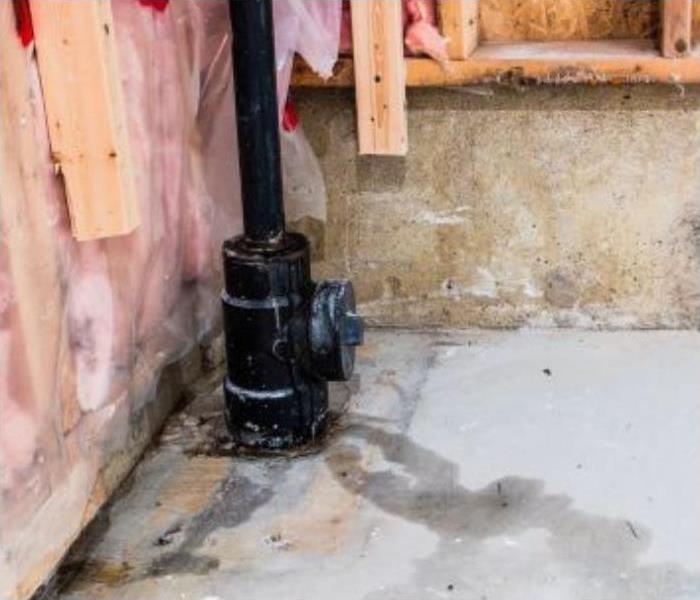How to Fix Water Damage in the Basement
3/12/2024 (Permalink)
 Facing water damage in your basement? Learn how to fix it with our guide. Find solutions, preventive tips, and a professional help recommendation.
Facing water damage in your basement? Learn how to fix it with our guide. Find solutions, preventive tips, and a professional help recommendation.
Are you facing the frustrating issue of water in your basement? Dealing with water leaking into basement can be a challenging task, but fear not! In this guide, we'll walk you through the steps on how to fix water damage in the basement. From identifying the causes to implementing effective solutions, we've got you covered. Besides, if you need professional help in dealing with Weymouth water damage restoration, the recommendation is out there if you keep reading.
Causes of Water Damage in the Basement
Before diving into solutions, it's essential to understand what causes water damage in the basement. Common culprits include:
- Poor Drainage: When rainwater isn't properly diverted away from your home, it can seep into the basement. This can lead to dampness and mold growth, creating a breeding ground for pests.
- Cracks and Gaps: Cracks in the foundation or gaps around windows and doors provide pathways for water to enter. These openings can also weaken the structural integrity of your home over time.
- Sloping Landscape: If your yard slopes towards the house, rainwater can accumulate near the foundation and find its way into the basement. This can result in erosion of the soil around your home's foundation.
- Clogged Gutters: Gutters and downspouts that are clogged or damaged can lead to overflow, resulting in water pooling around the foundation. This standing water can attract mosquitoes and other insects, which can be annoying and even present a potential health risk.
Tackling Water in Basement
It's also important to emphasize the importance of proactive maintenance to prevent water damage in the basement. Regularly inspecting your home for signs of water seepage and tackling any issues quickly can save you time, money, and headaches down the line. Keep an eye out for dampness, mold growth, or musty odors, as these can indicate underlying water problems. By staying alert and proactive, you can nip potential issues in the bud and protect your basement from water damage.
How to Fix Water Damage in the Basement
Now that you understand the potential causes and preventive measures, let's discuss how to tackle water damage in the basement. Remember, by following these solutions, you can handle water damage in your basement and safeguard your home from future incidents.
- Extend Gutters: Make sure your gutters are long enough to carry water away from your house (at least 10 feet away). This helps keep water from getting close to your home's foundation.
- Plug Gaps: Seal any cracks or gaps in the foundation, windows, and doors to prevent water from sneaking inside and seeping.
- Restore the Crown: Fix the slope of the ground around your home so water flows away from the house. This helps keep water from collecting near the foundation.
- Reshape the Landscape: Change the shape of your yard so water moves away from your home's foundation. This stops water from gathering near your basement walls.
- Fix Footing Drains: Check that any drains near your house are in good condition. These drains help move water away from your home's foundation.
- Install a Curtain Drain: Consider adding a special drain around your home. This drain, also known as a curtain drain, catches and moves water away from your home's foundation.
- Remove the Water with Pump: If your basement floods, use a pump to get rid of the water fast. This helps prevent damage to your basement and belongings.
- Make the Walls Waterproof: Put a special coating on your basement walls to stop water from seeping in. This protects your basement from water damage.
- Improve Indoor Air Quality (IAQ): Damp environments are breeding grounds for mold and mildew, which can affect IAQ and lead to respiratory problems. To improve IAQ, ensure proper ventilation and consider using dehumidifiers to reduce moisture levels in the basement. Besides that, inspect and clean HVAC systems to prevent the spread of particles (contaminants) carried through the air. Prioritizing IAQ creates a healthier living environment for you and your family.
Seeking Professional Help
If you're facing extensive water damage in your basement, don't hesitate to seek professional help from a reputable water damage restoration company. They have the expertise and equipment to assess the situation and provide effective solutions to restore your basement to its pre-damaged condition.
Reach Out to SERVPRO of Weymouth, Hingham and Quincy for Immediate Help with Basement Water Damage
If you live in Weymouth area, and are unsure who to contact for your water damage concerns, SERVPRO of Weymouth, Hingham and Quincy is Here to Help®! With over 20 years of experience in the restoration industry, our IICRC-certified team is fully equipped to take care of your water-damaged basements and much more than that! We are available 24/7 for your emergency needs! So, don’t wait, contact us today at (781) 337-0344 or submit an online contact form on our website for a free consultation!






 24/7 Emergency Service
24/7 Emergency Service